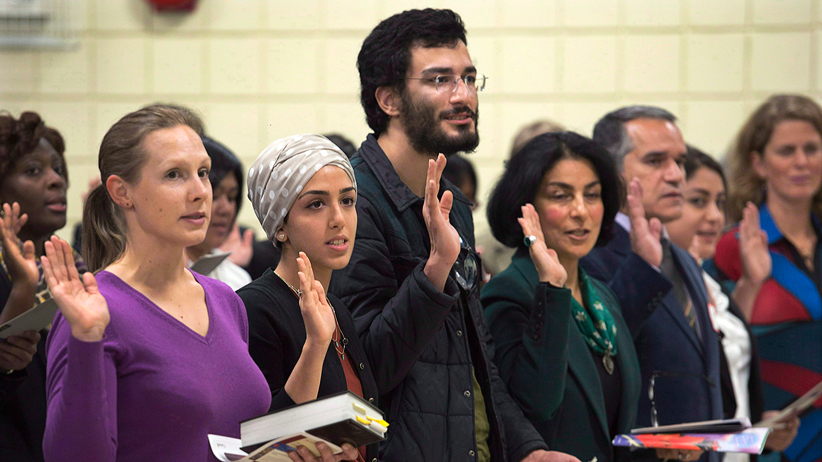Stephen Harper’s veiled threat
A sweeping Supreme Court declaration on the niqab suggests the federal government may be in the wrong
New Canadians take the oath of citizenship at a ceremony in Dartmouth on Tuesday, October 14, 2014.The federal government says Canada welcomed a record number of new citizens in 2014.Citizenship and Immigration Minister Chris Alexander says more than 260,000 people became new Canadians during 2014. Credit: Andrew Vaughan/CP
Share

Anyone who has followed the running skirmishes between Prime Minister Stephen Harper and the courts might reasonably assume that the latest niqab controversy follows a familiar storyline. The Conservatives pass a law in a sensitive area, the courts overturn it on Charter of Rights and Freedoms grounds, and the old tension between elected politicians and appointed judges flares up again. But that’s not what happened this time. In fact, the Tories didn’t pass any new law to ban face veils such as the niqab during the swearing of the citizenship oath; they just wrote a guideline to that effect for citizenship judges to follow. When a niqab-wearing Muslim immigrant from Pakistan objected to uncovering her face, a Federal Court judge found—without even having to invoke the Charter’s protection of religious freedom—that the new guideline wasn’t allowed under Ottawa’s existing regulations.
If that sounds like quibbling over administrative rules, the political fallout indicates a lot more is going on here. In announcing his decision to appeal that Federal Court ruling, Harper framed the issue in terms of defending Canadian identity, declaring last month that face veiling is “not the way we do things here.” In the House, he later denounced the niqab, which is worn in Canada by a small minority of Muslim women, as being “rooted in a culture that is anti-women.” Liberal Leader Justin Trudeau accused Harper of trying to “foster prejudice directly toward the Muslim faith.” Despite all the heated political rhetoric, though, some legal experts see no reason to expect this particular case, when the appeal is eventually heard, to amount to a serious test of when the government is justified in limiting the ways people express their faiths.
The judge who ruled against the guideline banning face-covering veils during the reciting of the citizenship oath found that it conflicted with an older regulation, one that requires citizenship judges to allow “the greatest possible freedom in the religious solemnization” of the oath. University of Toronto law professor Denise Réaume says the vehement reactions of Harper and Defence Minister Jason Kenney, who brought in the anti-veiling guideline when he was citizenship minister in 2011, belie the fundamental weakness of their legal position. “There couldn’t be a clearer case of government ministers just whipping up the population when they haven’t got a legal leg to stand on,” Réaume says. If they really want to invite a decisive Charter challenge, she adds, the Conservatives should explicitly rewrite the citizenship-ceremony regulations to assert the symbolic importance of unveiled oath-taking by new Canadians.
Read More: The weak and uninspiring case against the niqab
Based on comments from Harper and, especially, from Kenney, the government seems to think it can justify not allowing the niqab, largely on grounds that Muslim women are not, in fact, required for religious reasons to cover their faces in public. In an interview with Maclean’s, Kenney stressed his own understanding that this isn’t a genuine issue of religious freedom. “I note that a huge number of Muslims have reminded me that the face covering is not a religious obligation,” he said. “This is a cultural tradition of Arab tribes from the pre-medieval period that has been imposed on some women.” But the Supreme Court of Canada, in a landmark 2012 decision, said that sort of historical analysis is irrelevant, if an individual sincerely believes that the niqab is a required form of religious observance.
That decision was handed down in a case involving a woman who wanted to wear a niqab while testifying against two men she claimed had sexually assaulted her. The court had to weigh her right to religious freedom against their right to a fair trial. Writing for the majority in a split decision, Chief Justice Beverley McLachlin said trial judges had to decide on a case-by-case basis, assessing in each instance if “the salutary effects of requiring the witness to remove the niqab outweigh the deleterious effects of doing so.” McLachlin was clear, though, that a wide ban on the niqab, on grounds that religious expression has no place in a “neutral space” like a courtroom, would be going too far. “It is inconsistent with Canadian jurisprudence, courtroom practice, and our tradition of requiring state institutions and actors to accommodate sincerely held religious beliefs insofar as possible,” she wrote.
Further Reading: MP Larry Miller apologizes for “stay the hell where you came from” comment on the niqab
That sweeping declaration from the top court on how governments must allow religious expression suggests Harper and Kenney have a tough case to make. Still, not all experts see them as doomed to lose their appeal case over banning veils during the citizenship oath. University of Saskatchewan law professor Dwight Newman says the Federal Court judge who made the ruling might have read too much into the regulation requiring religious freedom during the ceremony. “I think the natural reading of that is people might swear the oath on different religious books,” Newman says. “But I’m not sure that regulation, in the way the judge suggests, has anything to say about the niqab.” Maybe not. Politicians, professors and pundits, though, seem to be talking these days about little else.